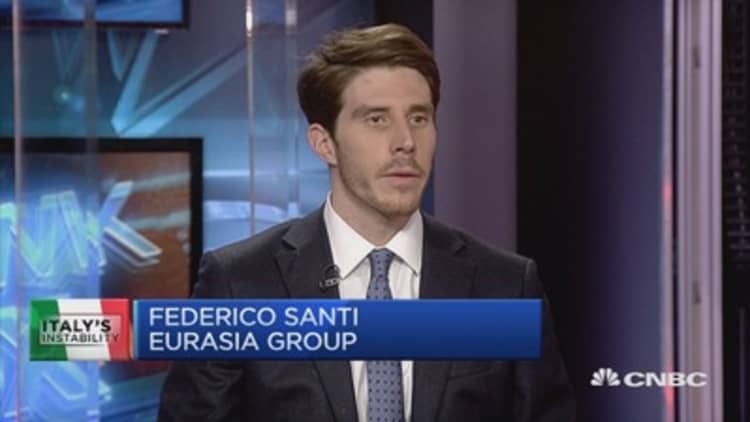Concerns over the future of the European Union have increased as several key elections approach and issues surrounding sovereign debt remain.
Italian, French and Greek government bond yield spreads over the German bund have reached new highs amid market nervousness that Europe could be back in a state of crisis.
"Somehow the market is there already," Beat Wittmann, partner at Porta Advisors told CNBC on Wednesday.
"We will have elections in the Netherlands, in France, in Germany, in one, two, three, four months and that's an eternity in politics, as we have seen in the last 12 months. So yes, in Europe, things will get rougher and more nervous but a lot of that is in the market already," Wittman added.
The political calendar is busy, with core member states electing new leaders, but it could become busier with the possibility of snap elections in Italy and Greece.
Snap Italian elections
The yield on the Italian 10-year government bond rose to 201.8 basis points over Germany on Wednesday morning, the highest since February 2014. According to Alex Dryden, global market strategist at JPMorgan Asset Management, this was due to political risks.
He told CNBC over the phone that investors see the possibility of snap elections being called in the near future.
"We do have some concerns if they call elections," Dryden added.
Italy is under a caretaker government after former Prime Minister Matteo Renzi resigned late last year. However, President Sergio Mattarella has refused to call elections before political parties agreed on changes to the electoral law. A court ruling at the end of January upheld some changes to the constitution, supporting views that elections before the summer were possible.
Investors are worried that that the Italian election would further destabilize the euro zone -- especially if the populist 5-star movement, which has promised a referendum on the country's membership of the euro, makes a strong showing in the polls.
"The most immediate reason why Italian bonds fell this morning is their close connection to renewed tensions over the Greek bailout terms with new disagreements between the Eurogroup of sovereign creditors and the IMF," Jan Randolph, director of sovereign risk at IHS Markit told CNBC via email.

Greek drama
"This "Italian connection" pattern was established in past bailout tensions amongst Greece's public-based creditors; and highly indebted euro zone governments like Italy are seem as vulnerable. If Italy were to ever to get into debt trouble again – like in the last few weeks of the Berlusconi government – then a bailout would be virtually impossible if the euro zone creditors and IMF cannot agree on debt sustainability issues. This scenario would be potentially explosive for the Eurozone," he added.
Greece has also returned to the headlines this week as it is once again at odds with its creditors over the need to impose further austerity measures. If such impasse isn't overcome over the next few weeks, then Greece might be in trouble to repay creditors in the summer and become another headache for European leaders at a time when their main focus in on winning elections.
French farce?

This is the case in France, where the outcome of the presidential election gets more uncertain by the day. The 10-year government bond yields rose 78.8 points against the German bund on Wednesday morning, the highest since November 2012.
"A Le Pen win in France with a clear program to put the EU, the euro, NATO, etc up for referendum of course is going to drive these spread yields as we get closer to the election," Wittman said.
However, Dryden from JPMorgan belives that political risk is "overdone" in France, given that the election includes two rounds, which decreases the chances of a final win for the far-right of Le Pen.
Nonetheless, as the political calendar advances and the European political landscape becomes clearer, there should be some buying opportunities around.
"I am a firm believer that by the end of the year there's full integrity of the euro zone, I'd treat that as a buying opportunity (Italian bonds)," Wittman told CNBC.


